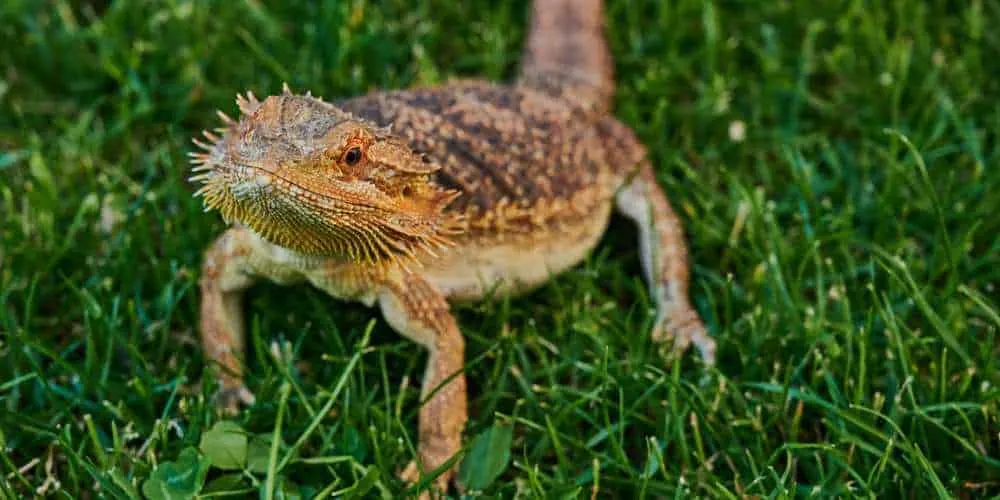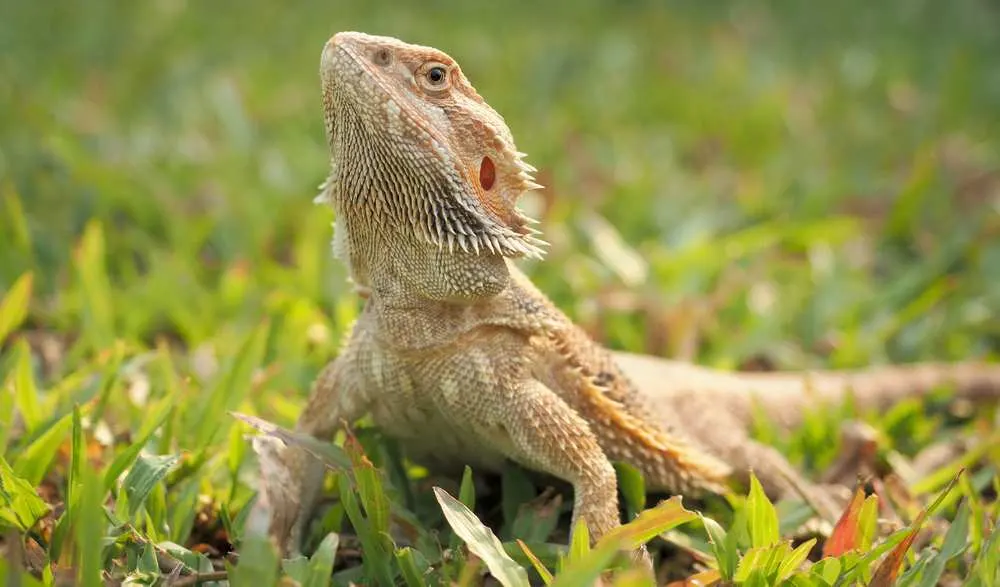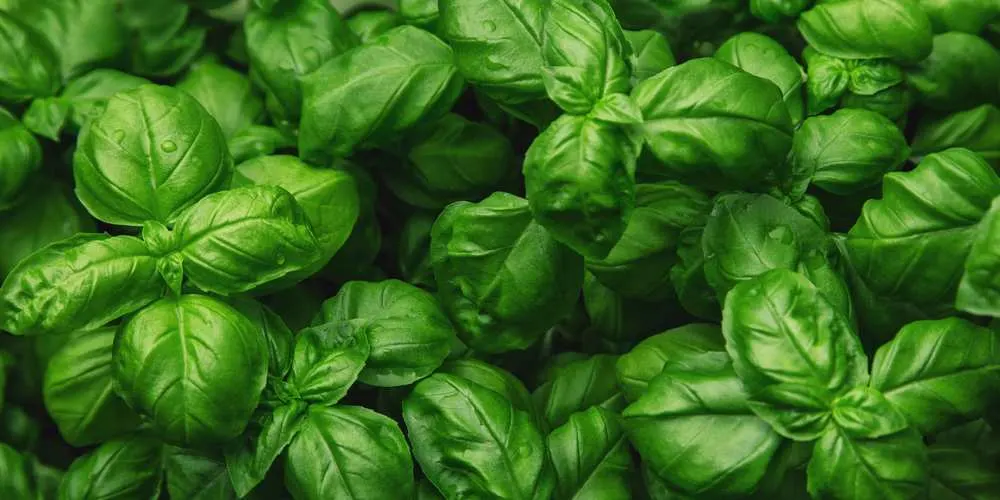If you’re a person that likes their food with some flavor added (and I assume you are), you must have asked the question “Can bearded dragons eat basil?”. If you like this herb in your food as much as I do, that’s a perfectly logical question.
Without any hesitation, my answer is YES, but with some caveats. There are a lot of ways you can implement this tasty herb in your culinary experiments and your bearded dragon’s diet. However, there are some variations and situations to be aware of regarding using basil in your beardie’s diet (more on that later).
One might say basil has too strong of a smell, or it’s not rich in nutrients enough to be implemented in your beardie’s diet. To find out how people who claim this are wrong, keep reading and find out for yourselves!

Nutritional Value Of Basil – Everything You Need To Know
Besides bugs and insects, bearded dragons need a healthy dose of vegetables, some fruits, and herbs in their daily diet. This is due to a complex list of nutrients they need to stay healthy and longer-living.
In order to understand how beneficial this herb is in your bearded dragon’s day-to-day diet, I suggest you check out the nutritional values that are found in basil:
| INGREDIENT | VALUE |
|---|---|
| Protein | 3,15 g |
| Energy | 23 kcal |
| Fiber | 1,6 g |
| Water | 92,06 g |
| Potassium | 295 mg |
| Vitamin C | 18mg |
| Phosphorus | 56 mg |
| Iron | 3,17 mg |
| Sodium | 4 mg |
Just by looking at this table, you can figure out how much of each nutrient is found in just 100 grams of basil. The first time I found this out I was fascinated as well! Just keep in mind that you shouldn’t feed your beardie this much basil, but more on that later.
There were a few things that caught my eye, take a look:
- Energy: Less than 30 calories per 100 grams are truly astonishing! This means you don’t have to worry about the daily calorie intake of your pet because this can’t even come close to the limit.
- Vitamin C: Everyone knows that vitamin C is fantastic for your health and immune system, and the same goes for your beardie. Because of this, basil that is rich in vitamin C is a perfect addition to your pet’s diet, and there’s no doubt about it.
- Phosphorus: This ingredient is crucial to the well-being of your beardies’ bones. Phosphorus is essential to the growth and density of teeth and bones. Knowing that beardies’ teeth are different from human ones, makes no difference whatsoever when talking about this substance and its importance.
- Water: Like any other living being on the planet, lizards need water. The percentage of water in basil is amazing. This means not only that they get all the nutrients they need, but they also get additional water in their system.
As you can see, there’s not one thing that is bad for your pet in this herb. This is a rarity when talking about feeding time because almost every other food is missing some components to be considered flawless. Now you can see that it’s not the case with basil.
Another benefit to this herb is that it’s cheap and easy to find. Every market has them and they should be available throughout the year.
You can also take some basil seeds and plant them in your back garden or into small pots and keep them on the windows. This will ensure that you’ll have practically unlimited quantities of this herb for your pet.

How To Implement Basil Into Bearded Dragon’s Diet?
There’s no easier task than to get your beardie to eat something new! They always crave food and are always up for some new things in life. This will make it an easier job for you because you won’t need to struggle to mask the new food with something already familiar to your beardie.
Basil has a very pleasant smell to it, which makes your pet more attracted to it. This is another thing that’ll make your job easier. Maybe you can use basil as a mask for other unpleasant smells like the smell of crickets when it’s feeding time.
What I like to do is to feed my beardie from the hand. This makes for a great bonding process between you and your pet. If you have little kids that are afraid of lizards, you can always help them overcome their fear of them by hand-feeding your beardie some basil.
The best way to implement this herb into the regular diet of your bearded dragon is to leave a bunch of basil leaves (when I say a bunch, I mean 2 or 3 leaves) in the tank somewhere. What this will do is it will stimulate your beardie to work for its food tearing the leaves into smaller pieces before eating it.
If you want to make it easier for them, you can always tear the leaves yourself and make the feeding process much faster, but much less fun!
Dried Basil
Some people have also asked me if my bearded dragons can eat dried basil. This is a legitimate question because some people don’t expect that beardies can even eat fresh basil!
Unfortunately, it’s not recommended that you feed your bearded dragon with dry basil. This is because when herbs are dried (and due to the drying process) they end up with a much more concentrated content of some nutrients like phosphorus.
This might seem like a good thing, but I assure you it’s not. Beardies can take some amount of concentration when talking about food ingredients, but remember that their little stomachs are not used to things such as candied fruit or dried herbs.
This is an unnatural food for them and should be avoided at all costs.
If however, your beardie gets its claws on some dried basil, it’s not a big deal (considering we’re not talking about eating a whole bag), you should just make sure it has a fresh water source and that’s it. It will digest the dried-up leaves and get the nutrients out of its system fast enough.
Basil Seeds
This is another thing that pops up quite often when talking about basil in this context. It’s also a justified question.
Sadly, the answer doesn’t differ much from the one regarding dried basil. Beardies shouldn’t eat basil seeds because these are rich in fat and that’s a no-go for bearded dragons.
I highly recommend that if you have some of these layings around the house you plant them and feed your beardie with some fresh basil while eliminating the risk of your pet nibbling on them.
These seeds also have a very rough texture and that’s another reason why they aren’t suitable for your pets. They’ll have a rough time trying to chew them, and if they end up doing so, there won’t be much to enjoy.

How Often Should My Beardie Eat Basil?
This is something that people might have different opinions on. I personally don’t like to give my beardie basil more than two or three times per month. You wouldn’t do wrong if you give it to them once a week, but you must be careful about the amount of basil. Remembering that the “moderation is key” mantra is always helpful!
I don’t recommend giving your fully grown bearded dragon more than two leaves at a time because that’s the maximum they should get.
This is because of the high amount of calcium in basil which can be (as most things) unhealthy when you go overboard with it. Maybe it’s best for you to ask your beardie’s vet how much calcium your pet needs next time you visit them.

Can Bearded Dragons Eat Basil? – Final Thoughts
It seems quite clear to me if bearded dragons can eat basil. Like with most other food that is not processed sugars, it’s quite healthy to implement it in your beardies diet but in moderation.
So the simple answer is still a yes. This is due to many benefits of basil and its ingredients which are desirable in anyone’s diet, not only your beardies’.
So if you have the skills to plant some basil in some cute pots or your backyard, I suggest you do that because it’ll not only be a great addition to the Sunday lunch but your bearded dragon’s diet!

